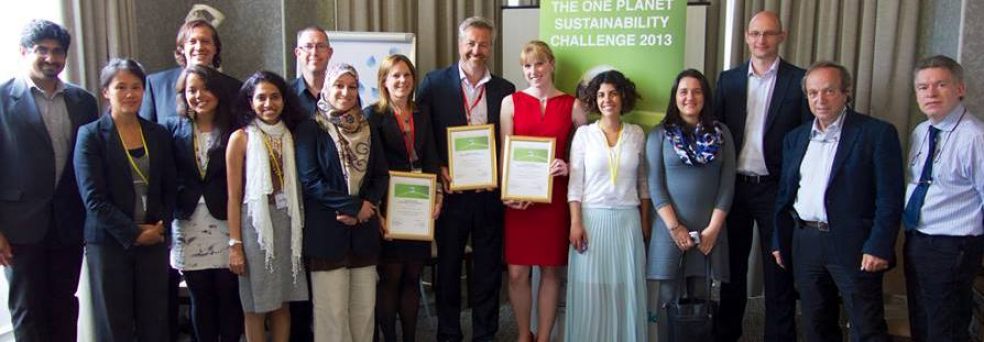
One Planet MBA hosts first ever Exeter Sustainability Challenge
Teams from as far afield as France, Ireland, the Netherlands, Australia and Mexico came to Exeter last month to compete in the first ever One Planet Sustainability Challenge. 15 teams in total participated in the competition.
In the United Nations designated Year of Water Cooperation, the event was partnered by three companies all of whom face real challenges in their water management strategies, Coca Cola Enterprises (CCE), SABMiller and South West Water. They were joined by two supporting partners, WWF and Water Aid.
In 2012, CCE used a total of 8.8 billion litres of water, reducing its water use ratio by 14.6% since 2007. CCE has implemented a range of technologies to achieve greater water efficiencies and saving water has been fundamental to its success. The task it set for the competing teams was to identify innovative ways for businesses to minimise water impacts throughout their entire value chain.
SABMiller is one of the world’s leading brewers with more than 200 beer brands and 70,000 employees in 75 countries. It believes that business is not separate from society, and that its success is inextricably linked to the well-being of the wider community. SABMiller works hard to build strong local businesses that contribute to their local economies everywhere it operates. It wanted the teams to look into how the private sector can work with developing country governments and other stakeholders to ensure water resources are priced at a rate that reflects its opportunity cost while at the same time ensuring the development needs of these countries are being met.
During the two days the participants also heard from a number of international experts including David Grey, Former Senior Water Advisor at the World Bank and now Visiting Professor at the Universities of Exeter and Oxford who said: “Institutional failure at a global level is currently resulting in intolerable levels of water risk-with huge consequential human, geopolitical and economic impacts. As a society, we need to move beyond the local management discussions, beyond questions of water sovereignty and develop global, system-level solutions to global water variability.”
Chris Loughlin, Chief Executive Officer at South West Water brought a local perspective and said: “The role of community focused, small scale solutions are critical as a tool for tackling the global issue of water stewardship. South West Water is committed to supporting local communities, exemplified through our work to reinstate water storage capacity in moorland areas and through the direct provision of small-scale grants to local farmers to reduce river water contamination.”
The competition winners will enjoy an all-expenses-paid trip to visit the water plants of Coca Cola and SABMiller. Winning students from Oxford Brookes University will visit Coca Cola in Belgium. The winners from Exeter’s One Planet MBA will visit a water project in India with SABMiller.
Malcolm Kirkup, Director of the One Planet MBA at Exeter said: “The Water Challenge has been a huge success. Our One Planet MBA students independently conceived, designed and led this exceptional competition and demonstrated what responsibly-minded MBAs can achieve. They engaged 45 talented MBAs and Masters students from around the world. Professor Grey (former Senior Advisor to the World Bank) was so impressed by the creative ideas from the winning team that he will be promoting their ideas to the World Economic Forum. It is fabulous to see young managers having such an impact.”
David Grey was so impressed with the winning idea that he will present it at a meeting of the World Economic Forum’s ‘Global Agenda Council on Water Security’ shortly. He said: “I know that there will be considerable interest among council members, of which I am one. I believe that the winning idea has real business and sustainability potential."
The final report produced by the Sustainability Challenge can be viewed here.
Click here for more information about the One Planet MBA.
Click here for further information about the University of Exeter.














